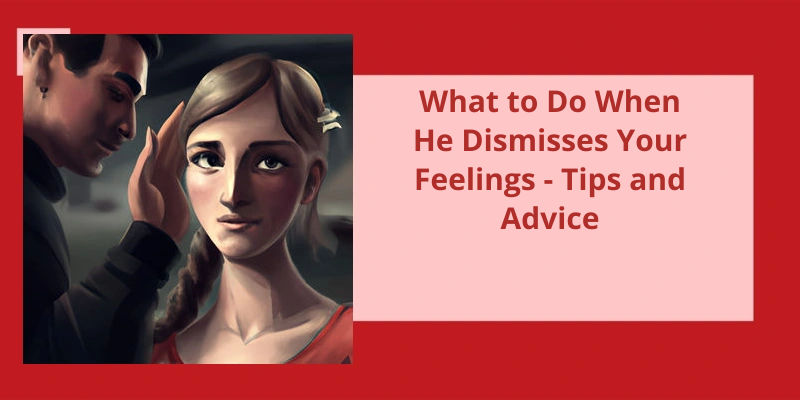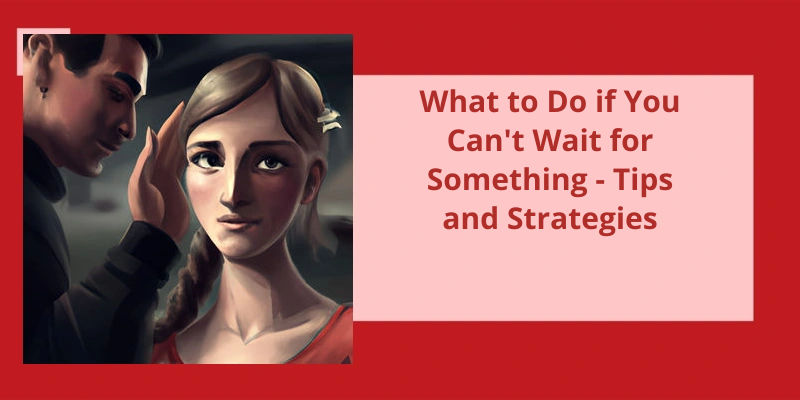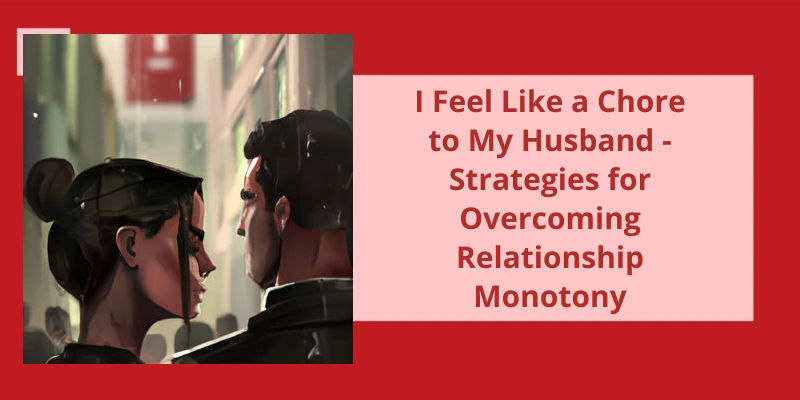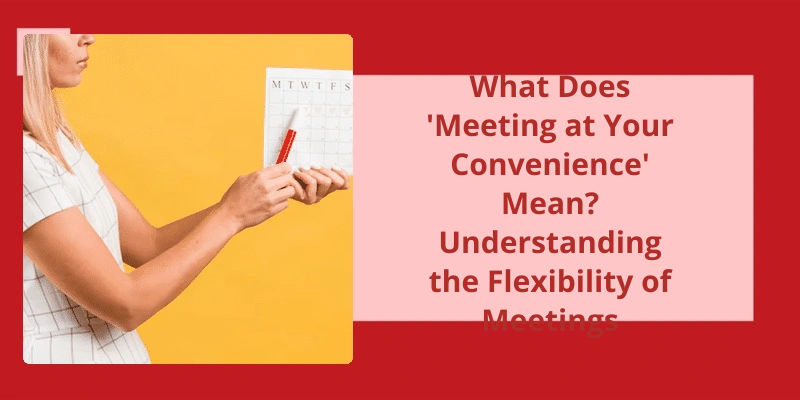It's an unfortunate reality that we can't always control how others react to our feelings. When someone dismisses our emotions, it can leave us feeling hurt, frustrated, and unsure of how to proceed. However, it's important to remember that our feelings are valid and deserving of respect. While it may not be easy, there are steps we can take to address the situation and advocate for ourselves. By setting boundaries, communicating effectively, and prioritizing our own emotional well-being, we can navigate these difficult situations with grace and self-respect.
What to Do When Your Partner Dismisses Your Feelings?
Be specific about what they said or did that made you feel dismissed. Give them examples of what you mean. This will help them understand your perspective and give them a chance to explain their own behavior. Sometimes, people don’t realize that what theyre saying or doing is hurtful. They may be dismissive because they feel uncomfortable with emotions or they don’t know how to respond. By talking it out, you can give them the opportunity to learn and grow.
It’s important to listen to what your partner has to say, even if you don’t agree with it. Ask them to explain their perspective and try to understand where theyre coming from. This doesn’t mean that you’ve to accept their behavior, but it can help you see the issue from a different angle. It’s possible that they’ve a valid reason for their dismissive attitude, even if it’s not apparent at first.
If your partner continues to dismiss your feelings after youve talked about it, you may need to seek help from a professional. A therapist can help you work through the issue and provide strategies for dealing with it. They can also give you tools for communicating effectively with your partner and setting boundaries. Sometimes, it’s better to have an objective third party to help you navigate a difficult situation.
Remember that your feelings are valid and important. Dont let anyone dismiss them or make you feel like youre overreacting. You’ve the right to express how you feel and expect to be heard. If your partner cant or won’t listen to you, it may be time to reevaluate the relationship. You deserve to be with someone who values your emotions and respects your opinions.
If the issue persists, seeking the help of a professional can be helpful. Remember, your feelings are important and deserve to be heard and respected in any relationship.
Understanding and recognizing dismissive behaviors in a relationship is crucial for maintaining a healthy and positive dynamic. It’s important to acknowledge the negative impact it can have on your emotional well-being and take active steps to address it. In this article, we will explore the signs of dismissive behavior and ways to cope with it.
What Does Dismissive Mean in a Relationship?
In a relationship, when one partner dismisses the other, it can be a very painful and demoralizing experience. It’s often a sign that the relationship is in trouble and that there are deep-seated communication issues that need to be addressed. Dismissive behavior can manifest in many different ways, from ignoring a partners needs to belittling or minimizing their accomplishments and feelings. This can have a profound impact on a persons emotional wellbeing, leaving them feeling lonely, dejected and unappreciated.
It’s important for both partners to address these issues together, and to work towards building a more equitable and supportive relationship. This may involve seeking professional help, such as couples counseling or therapy, in order to facilitate open and honest communication and to build mutual trust and respect.
This may involve seeking outside help or counseling, but ultimately it requires a commitment to open and honest communication, mutual understanding, and a willingness to work together to build a stronger and happier relationship.
Dismissive behavior can be hurtful and damaging to relationships. It not only shuts down communication but also disregards the feelings and opinions of others. In this article, we’ll explore the traits of a dismissive person and how to deal with them in various situations.
What Is a Dismissive Person Like?
If a friend shares an important personal experience with you and you respond with a casual “oh, okay,” thats dismissive. Being dismissive can cause hurt feelings, misunderstandings, and damage relationships. This type of person tends to make other people feel unheard and unimportant. They can come across as arrogant, uncaring, and unapproachable.
A dismissive person might have a sense of superiority or entitlement, believing that their opinions and experiences are more valid than others. They might interrupt or talk over others, not giving them a chance to share their own perspective. They might also belittle others by mocking their ideas or interests. This type of behavior can lead to resentment and a lack of trust in the dismissive person.
It can cause damage to relationships and cause others to feel neglected and unappreciated. A dismissive person may benefit from working on their communication skills and learning to be more empathetic and respectful of others.
Common Behaviors of Dismissive People in Personal and Professional Settings
This article discusses the common behaviors of dismissive people and how they may manifest in both personal and professional settings.
Recognizing dismissive behavior is important because it allows us to identify situations where others may not respect our thoughts or ideas. It’s crucial to understand how to deal with dismissive behavior and prevent it from hindering effective communication and relationships. Let’s explore some effective ways to manage dismissive behavior in different contexts.
What Is an Example of a Dismissive Behavior?
One common example of dismissive behavior is the act of interrupting someone while they’re speaking. This type of behavior suggests that the individual doesn’t value what the other person is saying and considers their own thoughts or opinions to be more important. Interrupting can also have the effect of making the other person feel as though their contributions aren’t being heard or valued.
This can occur in personal or professional settings, and can take on many forms. For instance, a manager or supervisor might brush off an employees concern about their workload, suggesting that they’re simply not up to the task. Ignoring someones feelings or concerns can be particularly damaging to relationships, as it can create a sense of mistrust and lack of respect.
Dismissive behavior can also manifest as passive-aggressive comments or behaviors. For instance, an individual might make snide comments about someone elses work or abilities in a way that’s meant to undermine their confidence or authority. Similarly, someone might intentionally withhold information or resources that could help another person succeed, again with the goal of diminishing their status or power.
For example, someone might speak in a monotone or quiet voice, suggesting that they aren’t interested or invested in the conversation. Alternatively, someone might cross their arms or lean away from the person they’re speaking with, indicating that they aren’t comfortable with the interaction.
Ultimately, dismissive behavior can have a significant impact on personal and professional relationships, creating feelings of frustration, anger, and dissatisfaction. It’s important to be aware of these behaviors and work to address them in a constructive way, whether that means speaking up when they occur, seeking the help of a mediator, or simply distancing oneself from toxic relationships. By recognizing and taking action against dismissive behavior, we can build stronger, more positive connections with those around us.
How to Deal With Dismissive Behavior in the Workplace
- Recognize the behavior: It’s important to be able to identify dismissive behavior when it happens so that you can address it properly.
- Remain calm: Stay professional and calm when communicating with the individual exhibiting dismissive behavior.
- Be assertive: Clearly state your perspective and feelings on the situation.
- Don’t take it personally: Remember that dismissive behavior says more about the individual exhibiting it than it does about you.
- Keep a record: Make note of any incidents of dismissive behavior and how you responded to them for future reference.
- Seek support: Talk to a trusted colleague, mentor, or supervisor for guidance and support.
- Consider escalating: If the dismissive behavior continues and becomes toxic, consider escalating the issue to HR or a higher-up in the company.
It can be frustrating and painful when a partner doesn’t seem to care or understand your emotional needs. The constant feeling of being disregarded can cause a strain on any relationship. It’s important to understand why your partner may be behaving this way and to communicate your feelings to them in a constructive manner.
What Does It Mean When Your Partner Disregards Your Feelings?
When your partner disregards your feelings, it can be incredibly hurtful and damaging to your relationship. It can make you feel unimportant, unvalued, and like your emotions are insignificant to your partner. This kind of behavior can also erode trust between partners and lead to feelings of resentment and anger.
Let them know how their behavior affects you and try to work together to find a solution that works for both of you. It’s also important to set healthy boundaries and to make sure you aren’t enabling your partners behavior by allowing it to continue without consequence.
In these cases, it can be helpful to communicate your needs clearly and explain why their behavior is hurtful. It may also be useful to seek counseling or therapy to work through these issues together.
However, if your partner consistently disregards your feelings despite your efforts to communicate with them, it may be a sign of deeper issues in the relationship. It’s important to recognize that you deserve to be with someone who values and respects you, and to consider whether staying in the relationship is truly in your best interest.
Ultimately, in a healthy relationship, both partners should be able to communicate openly and respectfully about their feelings, and work together to find solutions that honor each others needs. It’s important to address this kind of behavior early on and to take steps to prevent it from becoming a pattern that erodes the trust and respect between partners.
Source: Recognizing the Pain of Emotional Invalidation
Dealing with someone who dismisses you can be a frustrating and upsetting experience. However, it’s important to remain calm and professional when addressing the issue. Instead of resorting to confrontation or anger, there are several strategies you can employ to effectively communicate your feelings while still preserving the relationship. By remaining friendly and calmly addressing the behavior with the individual, you can take steps towards resolving the situation and moving forward.
How Do You Deal With Someone Who Dismisses You?
It can be difficult to deal with someone who dismisses you, especially if it’s a colleague or superior in the workplace. One approach is to remain friendly and nice, regardless of how they treat you. This can diffuse tension and prevent the situation from escalating. Plus, it’s easier to maintain your composure when youre being kind.
Another option is to call the person out on their behavior in a non-confrontational manner. This means respectfully addressing the issue and expressing how their behavior is affecting you. It’s important to avoid attacking the person or making accusations, as this will only make things worse.
If the behavior continues, it may be necessary to have a more serious conversation with the person. This can involve calmly explaining what’s offensive or hurtful about their behavior and asking them to stop. It’s important to use “I” statements, such as “I feel disrespected when you dismiss my ideas,” rather than making accusations or speaking for others.
In some cases, it may be necessary to involve a superior or HR representative. This is especially true if the behavior is discriminatory or violates company policy. Be sure to document any instances of dismissive behavior and provide concrete examples when bringing the issue to someones attention.
It’s important to remember that dealing with someone who dismisses you isn’t your responsibility alone. It’s up to both parties to work towards a solution. If the person is unwilling to listen or change their behavior, it may be necessary to limit your interactions with them or seek support from others in the workplace.
Overall, handling dismissive behavior requires patience, professionalism, and a willingness to address the issue head-on. By remaining calm and assertive, you can work towards a positive and respectful working relationship.
Conclusion
In conclusion, dismissals of one's feelings can be hurtful and confusing, but it’s important to recognize that everyone has their own emotional awareness and processing style. However, it’s crucial to communicate your feelings effectively and respectfully to your partner or friend. Expressing yourself in a non-judgmental and calm manner can help facilitate a constructive discussion, leading to a better understanding of each other's perspectives and needs. If the dismissals continue and situations become unhealthy, it may be necessary to seek the support of a therapist or counselor in navigating this difficult situation. Ultimately, it’s important to prioritize your mental health and well-being, and surround yourself with individuals who’re willing to listen and validate your feelings.






